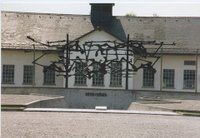Shun him, for he is the harbinger of death.
On the same day, I got a double dose of Holocaust remembrance.
First, I watched a Twilight Zone episode I had on the TiVo where a Nazi SS captain returns to a concentration camp 17 years later to visit his old "stomping grounds" and is haunted by the ghosts of his victims.
Second, I received a link to one of today's AP stories: Nazi-Era Files About Holocaust to Be Released to Public (danke, Tank) (printer-friendly version)
When the archive is finally available, researchers will have their first chance to see a unique collection of documents on concentration camps, slave labor camps and displaced persons. From toneless lists and heartrending testimony, a skilled historian may be able to stitch together a new perspective on the 20th century's darkest years from the viewpoint of its millions of victims.An interesting expression, "the bureaucracy of mass murder." But this bureaucracy was not the typical "red tape" of which we have grown accustomed. The efficiency and meticulous detail in human beings treating other human beings as objects is phenomenal.
"The overall story is pretty well established, but many details will be filled in," said Yehuda Bauer, professor of Holocaust Studies at the Hebrew University of Jerusalem.
"There is a great deal of very interesting material on a very large number of concentration camps that we really don't know much about," he said. "It may contain surprises. We don't know. It has material that nobody's ever seen."
A visitor to the archive comes into direct contact with the bureaucracy of mass murder.
Between 1933 to 1945, the Nazi persecution grew to assembly-line proportions, slaughtering 6 million Jews and an equal number of Gypsies, homosexuals, mental patients, political prisoners and other "undesirables." Tens of millions were conscripted as forced laborers.It has been my contention for years that Modern thought in general, and many of the tenants of The Enlightenment in particular contributed to the objectification of humanity seen so blatantly in the "Final Solution" (Endlösung der Judenfrage). I've been haphazardly working on a paper in that regard for years, but don't expect the fruit of it any time soon, but the mindset that a certain portion of the population are a question/problem requiring an answer/solution was how they approached the good society.
To operate history's greatest slaughter, the Nazis created a bureaucracy that meticulously recorded the arrest, movement and death of each victim. Sometimes even the lice plucked from heads in concentration camps were counted.
But as the pace of genocide stepped up, unknown numbers were marched directly from trains to gas chambers without being registered. In the war's final months, the bookkeeping collapsed, though the extermination continued.
Those undesireables whose existence was detrimental to society were first removed from public participation then ultimately exterminated. Is this not the same mindset with regard to abortion, whereby our America would be better off without those people?
 The Twilight Zone episode ("Death's Head Revisited") caught my eye because the concentration camp the captain visits is Dachau, which I had visited. Nestled in picturesque Bavaria is the reminder "man's inhumanity to man," and visiting it was perhaps the most sobering experience of my life.
The Twilight Zone episode ("Death's Head Revisited") caught my eye because the concentration camp the captain visits is Dachau, which I had visited. Nestled in picturesque Bavaria is the reminder "man's inhumanity to man," and visiting it was perhaps the most sobering experience of my life.Seeing the piles of shoes, suitcases, teeth, hair, and other personal effects of the prisoners was most disturbing. But even more so was seeing the gas chambers and the incinerators (which were concealed on the camp) used to dispose of the bodies.
One can only imagine the horror that must have awaited the Allies when the arrived to find mounds of bodies and mass graves, for in the accelerated operation prior to liberation the Nazis were not able to keep up with disposal.
In the Twilight Zone episode, the SS captain leaves the safety of South America to revisit his homeland, but particularly the concentration camp where he had "followed orders" as others had whereby 10,000,000 human beings were tortured in such camps for sadistic pleasure, experimentation, and overall efforts to advance the master race.
He is confronted by the ghosts of those he tortured and killed, being found guilty by their jury for crimes against humanity. They administer "justice" for him, which is insanity, but he is told, "Your final judgment will come from God."
Even before I was a Christian, I was a firm believer in the theological doctrine of total depravity. Knowing myself and others, this was no stretch, but seeing Dachau as a teenager really drove that point home. I had no confidence in man, for he is the harbinger of death.
The Nazi regime is a portion of German history that the vast majority would rather soon forget and issues of preservation of such reminders are hotly contested. Should they expend taxpayer money to preserve such images of horror and all the feelings they conjure?
The doctor at the end of the episode surveys the camp: "Dachau ... Why does it still stand?"
He is anwered with, "The moment we forget this, the moment we cease to be haunted by its remembrance."
I concur with Rod Serling who concludes with, "Something to dwell on and remember, not only in the Twilight Zone but wherever men walk God's earth."



0 Comments:
Post a Comment
<< Home